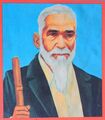Dr Vir Singh
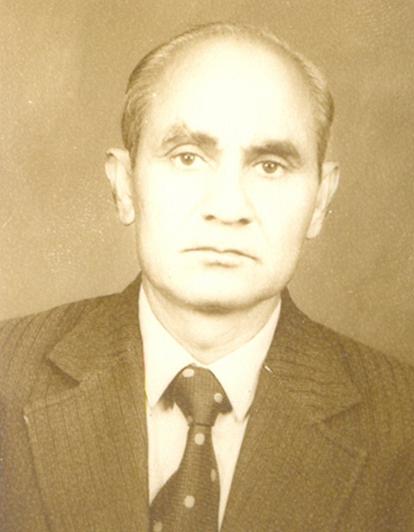
Dr Vir Singh (डॉ वीर सिंह) (b. 3 July, 1935 - d. 22 January, 2013) is an author and honorary Director of Maharaja Surajmal Centre for Research and Publication, run by Surajmal Memorial Education Society, New Delhi. Dr. Vir Singh after superannuation from Shaheed Bhagat Singh College, University of Delhi in 2000, joined Maharaja Surajmal Centre for Research and Publication. He has been actively engaged in the administrative, educational and research activities of the Society since 1976 as Joint Secretary of the Executive Committee (9 years) and Secretary Academic Committee since 1985 till date.
Early life
Dr Vir Singh was born on 3 July 1935 at village Sarangpur in Bulandshahar district in Uttar Pradesh in the family of a Hindu Jat of Sejwar Gotra. His father was Late Shri Hukam Singh, a mukhiya of the village.
Education
He studied at N.R.E.C. College Khurja from 11th standard (1953) to the completion of his M.A. and Ph.D.Degrees. Due to the adverse financial conditions of his family, after completing 12th standard in 1955, he had to join as a teacher in his own village Sarangpur to establish a school there. During this period he passed visharad, sahityaratna and prabhakar examinations. On the advice of then principal of N.R.E.C. College Khurja he took admission in first year as a regular student in 1959. In spite of all hardships he did not leave his objective of getting higher education. He got M.A. (Agra), Ph.D. (Meerut), B.Ed. (Delhi), Prabhakar (Chandigarh), Sahityaratna (Prayag) and Shastri (Kashi) degrees from six universities.
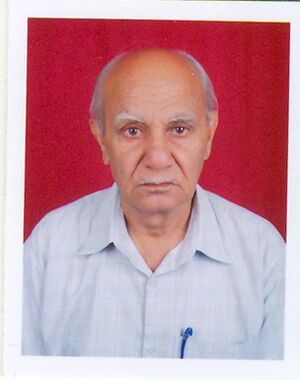
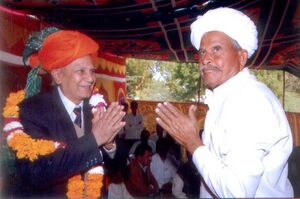
Publication
“Kamayani Ki Katha: Gaveshnatmak Anusheelan”, is his research work which was published in 1976. While explaining different aspects of history, geography, sociology, psychology, philosophy and allegory of this ancient narrative of deluge and development of mankind thereafter by Manu and Shradha, he learnt inter-disciplinary approach which he utilized while establishing the aforesaid Research Centre. This ancient narrative belongs to North West region of India- Gandhar, Sind, Punjab, the catchment area of ancient Saraswati River in Haryana and Western Rajasthan, which has been the cradle of Vedic Culture. It is also interesting that the early settlements of Jats are found in this region.
Updation of prominent works
Dr Vir Singh has used his intensive study of the primary sources on the Jats to update three prominent works on Jat History:
- ”Hindustan Mein Jat Satta” Wendel’s Memoirs on Jats, 2001
- History of the Jats, Prof K R Qanungo, 2003
- The Jats: Their Role in the Mughal Empire, Dr G C Dwivedi, 2003
His edited works
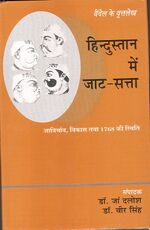
- हिंदुस्तान में जाट सत्ता (”Hindustan Mein Jat sattā”) Wendel’s Memoirs on Jats, 2001
- Smarika (Souvenir of the Society) based on Jat History, 1990
- Ganga Sagar, verses of the Jat Sant Gangadas, 1998
- Reminiscences of a Revolutionary- Raja Mahendra Pratap, 1999
- Jat aur Mughal Samrajya, Dr G C Dwivedi, 2002
- Maharaja Jawahar Singh aur unke uttaradhikari, Upendra Nath Sharma, 2003
- The Jats - Their Role and Contribution to the Socio-Economic Life and Polity of North and North West India. Vol I, 2004
- My Life story- Raja Mahendra Pratap, 2004
- The Life and Times of Raja Mahendra Pratap, 2005
- The Jats: Their Role and Contribution to the Socio-Economic Life and Polity of North and North West India. Vol II, 2006
- Jaton Ka Itihas (Sanshodhit) : Prof K R Qanungo, 2006
- The Jats : Their Role and Contribution to the Socio-economic Life & Polity of North and North-West India. Vol. III, 2007
- People's Role in 1857 Uprising: Delhi and Neighbouring Region, 2009
- The Life and Ideas of Shaheed Bhagat Singh: A Lession for Today, 2010
Reprinted Books
- Jaton Ka Naveen Itihas:part-I Upendra Nath Sharma, 2008
- Jaton Ka Naveen Itihas:part-II Upendra Nath Sharma, 2009
- Jat Itihas (Sanshodhit) - Thakur Deshraj, 2009
Organized series of National Seminars
- The Life and History of Jats, 1995
- The Life and Times of Raja Mahendra Pratap, 1998
- History and Life of the Jat Community: Trends and Prospects, 2001
- The Jats: Their Role and Contribution to the Socio-Economic Life and Polity of North and North West India, 2004
- The Jats: Their Role and Contribution to the Socio-Economic Life and Polity of North and North West India, 2005
- The Jats: Their Role and Contribution to the Socio-Economic Life and Polity of North and North West India, 2006
- Martyr of 1857 – Baba Shahmal, 2007
- People’s Role in 1857 Uprising – Delhi and Neighbouring Region, 2007
- The Life and Ideas of Shaheed Bhagat Singh : Lesson for Today, 2007
- The Life and Times of Maharaja Surajmal, 2007
- Martyr of 1857 Raja Nahar Singh, 2008
Research papers
Dr Vir Singh has participated and presented research papers in following 14 National and International Seminars.
- Wendel ke Jat-Satta Sambandhi Vritlekh (Samajarthik & Etihasik Pariprekshya) in the National Seminar on Rajasthan History and Culture Organized by Banasthali Vidyapeeth, Rajasthan on 15th – 17th March 2001.
- The activities of Revolutionary Raja Mahendra Pratap in Central Asia between the two World Wars in the International Seminar at International Centre, Lodhi Road, New Delhi on 5th February 2004.
- History of the Jats: Trends and Prospects in the Seminar – Jat Itihas par Tathyatmak Shodh organized by Chaudhary Bahadur Singh Trust Sangaria, Rajasthan on 13th – 14th March 2004.
- Participated and was the Chairperson of the first academic session in the National Seminar on North-East Region organized by Political Department of Rajasthan University, Jaipur on 7th – 8th August 2004.
- Relentless Struggle of Peasant – Zamindar of Eastern Rajasthan against Imperial powers during 1686-1695 in the National Seminar on Cultural Heritage of Rajasthan organized by Banasthali Vidyapeeth, Rajasthan on 22nd – 24th January 2005.
- Desh mein Sanyukt Sarkaron ki Bhumika aur unke Nitigat Aayam (Uttar Pradesh ki Pratham Samvid Sarkar) in the Seminar on Coalition Governments and Good Governance organized by Bikaner University, Bikaner on 25th – 27th November 2005.
- Technical Education by Raja Mahendra Pratap: A National Step in the international Conference on contribution of Raja Mahendra Pratap and professor Barakatullah Bhopali: Freedom struggle and its importance in contemporary society organized by Barkatullah University Bhopal on 1st – 3rd December 2005.
- Participated in the deliberations and was the Guest of Honour in the Valedictory session at International Seminar on “ Modernizing & Restructuring the District Administration on India in the era of Liberalization” organized by the Department of Public Administration, M.D. University Rohtak from 1st to 2nd March 2006.
- Lesson to learn from Arab Invasion in the National Seminar on “ Invasions and Invaders of India “ organized by Shri Natnagar Shodh Sansthan, Sitamau (M.P.) on 11th & 12th March 2006.
- Dhanna Bhagat ki Sadhna in the Punjab History Conference on “ Social Stratifications in Punjab: Political – Cultural Manifestations “ organized by the Department of Punjab Historical Studies, Punjab University, Patiala from 18th to 20th March 2006.
- Role of Raja Ram in the formation of Bharatpur State in the National Seminar on “ State and Society in Medieval India “ organized by the Centre of Advance Study in History, Aligarh Muslim University, Aligarh from 3rd – 5th April 2006.
- Chachnamah and the Jats. in the Seminar “ Jat Itihas par Tathyatmak Shodh” organized by Chaudhary Bahadur Singh Bhobia Trust Sangaria on 8th – 9th April 2006.
- The Contribution of Raja Mahendra Pratap & Shaheed Udham Singh in the freedom Struggle organized by the Vichar Manthan Sammelan at Raja Mahendra Pratap Prem Vidyalaya, Gurukul Narsan, Haridwar on 31st July 2006.
- Wendel’s Memoirs on Jats: An Appraisal in the 67th session of Indian History Congress at Farook College, Calicut University, Calicult (Kerala) on 10-12th March 2007.
Contact details
- Address E-177, Pandav Nagar, Delhi-110091
- Phone - Office 011-25552667, 011-25528117, Residence 011-22753070, Fax 011-25528116,
- E-mail: veersingh35@yahoo.com
Review of his important books
The Jats - Their Role and Contribution to the Socio-Economic Life and Polity of North and North West India. Vol I, 2004
This publication is the outcome of two National Seminars on the Jat History and Culture. The Jats are one of the prominent farming community among the Indian Population today. The origins and traditions of the Jats go back to dim antiquity. A critical study of the past history of such a community on the basis of all available material cannot fail to be a subject of deep interest and instruction to all Indians. The Scholars have assembled some of the rarest evidence available in Indian and non-Indian sources and telescoped into a knowledgeable and inspiringly readable historical analysis. The salient features of this publication are:
- Clan structure of the Jats, mobility and their early settlements and diffusion to other parts of North-West India in ancient period.
- Geographical spread of Jat settlements and migrations within and outside India in early medieval period.
- Crystalization of the Jats as Zamindars and dominant peasant community, nature of Jat uprising and the process of Jat state formation.
- Social and political awakening and Jat peasant movements in modern period.
- Aspects of social, economic and cultural life of the Jat community.
My Life Story 1886-1979: Raja Mahendra Pratap Vol. 1 1886-1941
Raja Mahendra Pratap was born (1886) in the Hindu family of Mursan and was married (1902) to a Sikh family of Jind. He got his education under British Headmasters and Muslim teachers all from Mohemmedan Anglo Oriented College Aligarh founded by Sir Sayyed Ahmad Khan. With this background he shaped into a true representative of secular society and got fully equipped to break the fetters of conversativism.
To bring India at par with European Countries, he established a free technical institute, ‘Prem Mahavidyalya’ in his place at Vrindavan on May 24, 1909. He donated most of his part of his estate to the educational institutions in Aligarh and Mathura districts.
After successfully devoting his attentions to questions of social and educational reforms and other constructive activities Raja Mahendra Pratap prepared himself to take a plunge into a still higher cause of liberating India from the yoke of the British. On 20th of December, 1914, at the age of 28 he left India for European countries to liberate India from the clutches of the British colonial rule with outside support. He had become a big menace there for the foreign rule in India. The British Government of India declared a reward on his read, attached his entire estate and declared him a fugitive. This historic document gives a vivid account of Raja Mahendra Pratap’s life and his activities upto 1946.
The introduction of this book gives a glimpse of his varied activities in chronological order to make it easier for the readers to understand the ideas of Raja Mahendra Pratap, the servant of mankind. This is an added advantage of this edition.
Life and Times of Raja Mahendra Pratap'
- Contents
- Editorial Note
- Introduction Ram Niwas Mirdha (Hindi)
- Inaugral Address: Raja Saheb Waqt Se Pahel Paida Ho Gaye The Manzur Ahmad (Hindi)
- Important Legacies of Raja Mahendra Pratap (Keynote Adress) Suhas Chakravarty
- Raja Mahendra Pratap and the Privisional Goverment of India at Kabul Ashok Kumar Patnaik
- Indian Revolutionaries Abroad—A Study of the role of Mahendra Pratap and the First Provisional Goverment of Independent India Rajpal Singh
- The Restless Raja—Rebel in Arms and an Apostle of Love A C Bose
- Raja Mahendra Pratap: A Zealous Revolutionary: 1919-1946 Yuthika Mishra
- Raja Mahendra Pratap and the Executive Board of India at Tokyo Dr. Vir Singh
- My Recollections Shiv Dhyan Singh
- Raja Mahendra Pratap Hari Singh
- Dwitya Vishva Yudh aur Raja Saheb Anand Mohan Sahai (Hindi)
- Raja Mahendra Pratap—Jivan Darshan Ki Ek Jhanki Ramesh Verma (Hindi)
- Raja Mahendra Pratap—Unki Zindagi ka Mission aur Sandesh Akbar Khan (Hindi)
- Utkarshmoolak Rajniti ke Sutradhar: Raja Mahendra Pratap Shiv Kumar (Hindi)
- Prem Dharma Sadhvi Mahaanandmayi Ma (Hindi)
- Manav Kalyan Soopan:Sansar Sangh Swami Mahanand Maharaj (Hindi)
- Prem Dharma Pravartak: Raja Mahendra Pratap Brij Biharilal Sharma (Hindi)
- Raja Mahendra Pratap se Sambandhit Sansmaran Jyotiswarup Singh, Brij Biharilal Sharma, Prabhdayal Massey (Hindi)
- Raja Mahendra Pratap: Ek Sampoorna Vyaktitva Anup Sharma (Hindi)
- Yehe Raj Pratha Raja Mahendra Pratap (Hindi)
- Contributors
Gallery of pictures
Author: Laxman Burdak लक्ष्मण बुरड़क
Back to The Authors






